As new free TV channel Spike shows Breaking Bad from the beginning, Jon Hotten looks at why the tale of Walter White’s transformation from mild chemistry teacher to terrifying crime lord is ‘the great modern study of male mid-life resentment’…
About ten minutes into the first episode of Breaking Bad, Walter White is being desultorily jerked off by his wife Skyler (“we’re just doing you tonight”) while she’s simultaneously watching an eBay auction on her laptop. It’s the evening of his fiftieth birthday.
He’s already been given fake bacon for his breakfast (“we’re watching your cholesterol”) and been patronised by his swaggering DEA brother-in-law Hank (“you look like Keith Richards holding a glass of milk”) at a surprise party he didn’t really want. He has spent the day teaching chemistry (“the study of change”) at the local high school and then doing a second job at a car-wash where he’s shoved around by the owner Bogdan and then humiliated when he is spotted washing rims by a couple of students from his chemistry class (“Oh my god… you’re not going to believe this…”).
Within 24 hours comes the real slam-dunk. Walt collapses at the car wash, gets carted off in an ambulance and is diagnosed with terminal lung cancer.
“Do you understand what I’ve just told you Mr White?” asks the doctor.
“Yes. I have inoperable lung cancer. With chemo I might live another two years… It’s just that you have mustard on your coat… right there…”
***
It’s one of the many glories of Breaking Bad that two years is exactly what Walt gets. Sixty-two episodes later, the show concludes on his fifty-second birthday (and forget about spoilers at this point. If you’ve not seen it yet, then you’ve not been wasting enough of your life in front of the TV…) Vince Gilligan, who created and ran the show, said that the idea was to take a character “from Mr Chips to Scarface.” Well maybe, but Walt had more depth and nuance than both by about episode three (as Martin Amis once wrote, Scarface “may as well be called Shitface” for all of the sledgehammer subtlety of Oliver Stone’s writing and de Palma’s direction). Instead, Breaking Bad became the great modern study of male mid-life resentment.
The set-up, brilliantly condensed into a single act of the first episode ‘Pilot’, reveals a lot more of Walt: he has a sixteen year old son, Walter Junior, who has cerebral palsy and uses crutches. Skyler is almost forty and pregnant. Walter’s idea of fun is to go to a lunar launch exhibition. He has not always been a teacher – in 1985 he contributed to research that won the Nobel Prize for chemistry.
It brings to mind another, similar suburban life and character, Lester Burnham in American Beauty. Although Lester blackmails his boss into giving him a $60,000 pay-off and starts buying primo-quality dope from a neighbour, he doesn’t quite break bad. His obsession is sexual. He fantasises over his daughter’s best friend. For a man who will become a crystal meth kingpin, Walter White is astonishingly unsexual, no mistresses, no molls. His obsession, his love, is chemistry. They are middle-aged men that give themselves permission to be free, and they cherish their brief escape.
These are the real riches that both stories reap. Lester trades his ad agency gig for a burger joint. Walt trades the car wash for a meth lab built in an RV. Lester finds friendship with Ricky, his dope dealer. Walt finds a surrogate son in his meth-cook former pupil Jesse Pinkman. Ricky and Jesse in turn have damaged relationships with their own parents.
The stories quickly diverge from their common start. Sam Mendes goes for a sort of melancholic loveliness of the ordinary, where Vince Gilligan breaks out the guns, drugs and bad guys and saddles up. For all of that, and Breaking Bad’s adrenalized, thrilling death-count is a big part of the buzz, Gilligan drags much of Mendes’ higher-minded sadness and rage along with the action.
***
Walt’s rage has a name – Heisenberg. Cancer sets this alter ego loose, but as Breaking Bad careens along, Walt’s resentment at the way his life has turned out puts the steel in Heisenberg’s balls. More of his past becomes clear. Along with the Nobel commendation, Walt founded Grey Matter Technologies with his girlfriend Gretchen and former classmate Elliott but later sold out to them for reasons that are never made explicit. The company made a billion-dollar fortune from his research and Elliott and Gretchen married.
In one of Breaking Bad’s signature time-lapse intros, a younger Walt and Skyler are viewing the house in which they still live. Walt is cocky, questioning whether it’s big enough for a man like him. It juxtaposes scenes at the birthday party of Elliott soon after Walt’s diagnosis. He and Gretchen live in unimaginable luxury. Elliott asks Walt to come back to the company and help him out, and hope dances in Walt’s eyes until he notices Skyler talking to Gretchen and realises that she has told them about the cancer. The job offer is pure sympathy. Hope is crushed.
Then there is the more nuanced hint of Walt’s son’s name. Walter Jnr? There is some ego in that.
Heisenberg rises, fed by respect. Walt’s very first meth cook has Jesse looking at him as if he is god (“man, you’re an artist…”). He kills the captive Krazy 8, faces down Tuco Salamanca, quickly makes hundreds of thousands of dollars. The arc is set. Vince Gilligan wanted to turn Walter “from a protagonist to an antagonist,” and Heisenberg is the vehicle. Across the next four seasons, Walt’s moral compass spins in the opposite direction to Heisenberg’s. His rationalisation that he’s ‘doing everything for his family’ is undercut by Heisenberg’s relish of power. Thus Hank’s obsessive pursuit of Heisenberg comes loaded with heavy dread. It can only end badly.
Breaking Bad and American Beauty carry their sad freight because the writing is so good, but also because Kevin Spacey and Bryan Cranston are so good. Spacey is done in a couple of hours. Cranston built Walter White into a giant over sixty of them. Walter begins with a moustache Cranston designed to look like “a dead caterpillar”. He wears patterned sweaters. Heisenberg is goateed and shaven-headed, with a sharp black hat. Cranston makes Walt stoop and cough. His mouth is hooked downwards, his lips disappear. When he gets angry, he throws a pizza onto his garage roof. Heisenberg dominates hardened killers with his body language and his eyes. When he gets angry, people die.
It’s no Jekyll and Hyde, though. Sometimes they mix, most meaningfully in the final season, first in ‘Say My Name’ when Walter kills Mike. It’s all there – Walt’s jerky run and shaky shot; Heisenberg’s cool apology as Mike sits by the river in his final minutes. Then in ‘Ozymandias’ Walt phones Skylar and goes full Heisenberg, raging at her for not supporting his criminal empire. As we realise that he knows the phone is tapped and he’s cleverly exempting her legally from any liability, Walt’s tears roll down Heisenberg’s face. It’s an extraordinary scene.
***
It’s impossible not to love Walt. The red phosphorus, the death of Gus Fring, the train heist – these are punch the air moments. His great monologues – “I’m the one who knocks” (written by Gennifer Hutchinson); “Say my name” (Thomas Schnauz); “Tread lightly” (Peter Gould) – are spectacular. Gilligan’s notion is to turn Walt into a monster, and by any account he is.
After Breaking Bad finished, I was jonesing for it. I watched the extras, and saw the cast interviews. They all found Walter’s transition to Heisenberg to be complete and damning. He had betrayed everyone he loved, and he had admitted that he did it not for them, but because he liked it.
His fate, they said, was just and righteously coming.
But who in their right mind would watch Breaking Bad and not root for Walt, especially when weighed against those he’d ‘betrayed’… Skyler is a shrike and a hypocrite who has an affair and then colludes with her boss/lover Ted Beneke to defraud the IRS even while she’s leaving Walt for being a criminal. Hank starts out as an overbearing, meat-head cop with racist tendencies, betting his Mexican partner Gomez that a drug-dealer they’re about to bust will be “a beaner” and taking happy-snaps of the corpse of a gang-banger crushed in a junkyard, before becoming a self-righteous, self-pitying renegade whose obsessive, off-piste pursuit of Heisenberg costs not just his life but Gomez’ too.
Marie is a nightmare, a judgemental apple-pie home-maker holding others to moral standards she has disregarded for herself, a shop-lifter happy to be bailed out by her cop husband and equally content to take what she believes to be the profits of Walt’s gambling habits to fund extra medical care for Hank after he’s shot by the Cartel. Walt Jnr is a sweet kid but somehow prefers Hank and his locker-room wisecracks to Walt’s earnest love of knowledge. Even baby Holly wants her mother more than her father.
You’re in with that lot? Really?
It’s only Jesse who has the real claim to betrayal, Walter having allowed his beloved Jane to choke in her sleep and then poisoned Andrea’s son Brock to have Jesse turn fatally on Gus Fring. In a very early episode, Jesse’s mother revels that Walter was “one of the few teachers who cared” about Jesse. From that moment they were joined, and Walt ultimately repays his debt, taking a bullet to keep Jesse alive and engineering his escape from the slavery of the nazi biker meth lab.
***
There’s plenty wrong with Breaking Bad. Early storylines like Skyler’s writing ambitions and Marie’s shoplifting disappear. Some of the derring-do, especially the big magnet outside the police station and the prison hit, are too outlandish for a show with a tight internal logic. Hank becomes almost completely unaccountable at the DEA. Lydia’s instant availability as Fring’s de facto replacement is overly convenient, and so on.
But who cares? Breaking Bad isn’t The Wire. It has no social conscience, no higher purpose. It’s fun. That’s what makes it great. It has characters that couldn’t exist anywhere else. The veteran hit man Mike Ehrmantraut drips with unspoken sadness. The psychopath biker Todd is weirdly chilling. Mark Margolis’ wordless turn as the crippled, mute Hector Salamanca, a man kept alive by sheer hatred, is beautifully done, as is David Costibile’s doomed nerd chemist Gale Boetticher, perhaps the only character that loves Walt unconditionally. Gus Fring, dead-eyed and creepily subservient until he’s opening throats with a box-cutter, gets the single most memorable death in modern television. Saul Goodman, the comic turn in Breaking Bad, carries enough of a burden to hold his own (rather wonderful) spin-off series. Badger and Skinny Pete, mind-blown, stoner party pals for Jesse, are perfectly pitched.
Some of the best moments are in the small details. Jesse calls Walt “Mr White” throughout all five seasons. Who doesn’t think of their old schoolteachers in that way? And the real 1985 Nobel Prize for chemistry – well that was awarded to Herbert Hauptman and Jerome Karle for their research into crystal structures. There are many such touches.
The ends of big series rarely bring consensus, because fans are too invested. Breaking Bad went perfectly into that good night, right down to the choice of Badfinger’s Baby Blue for Walt’s last moments. In death he smiles, free at last, offering a final answer as to whether it’s better to die on your feet or live on your knees.

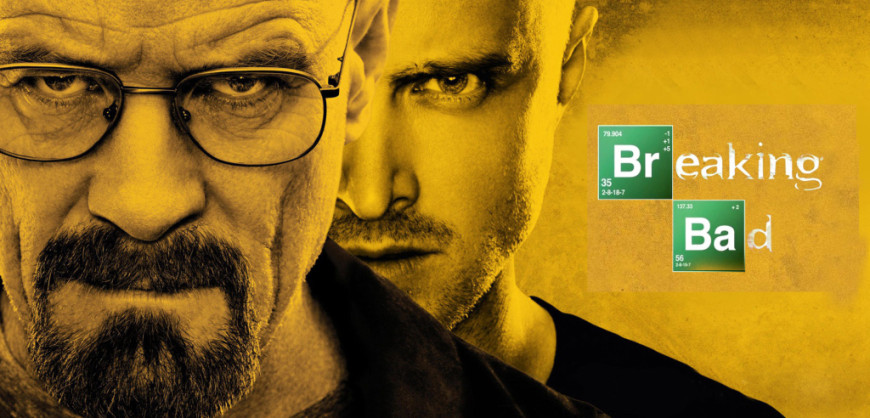
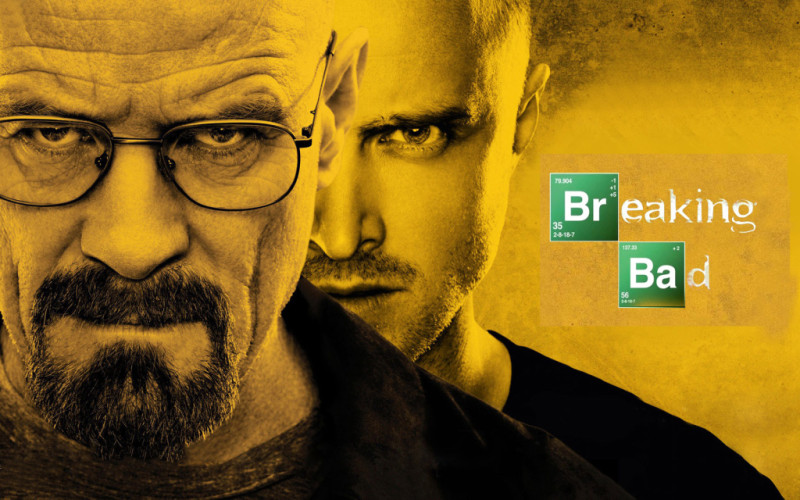
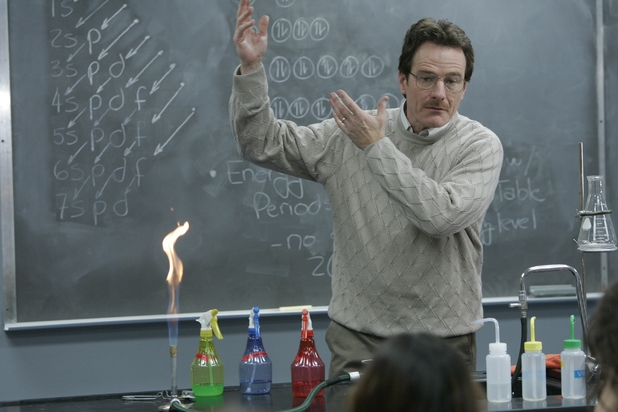
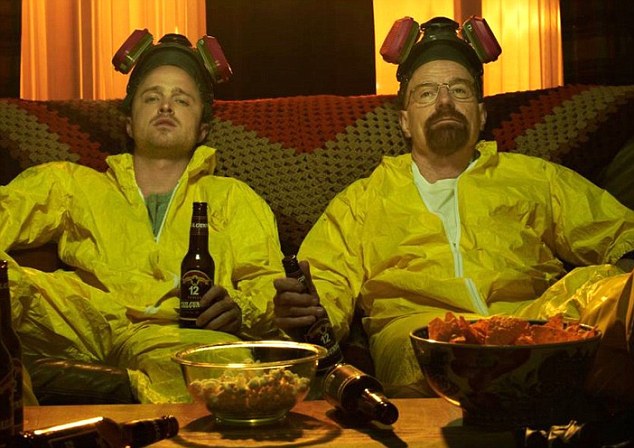

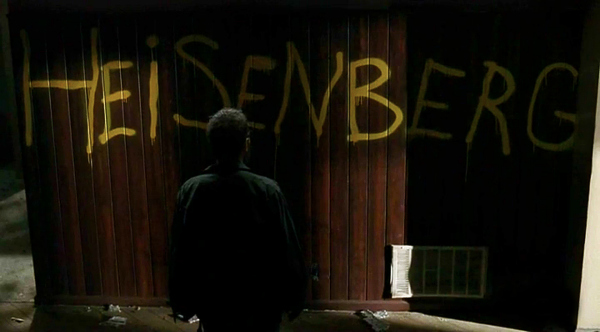
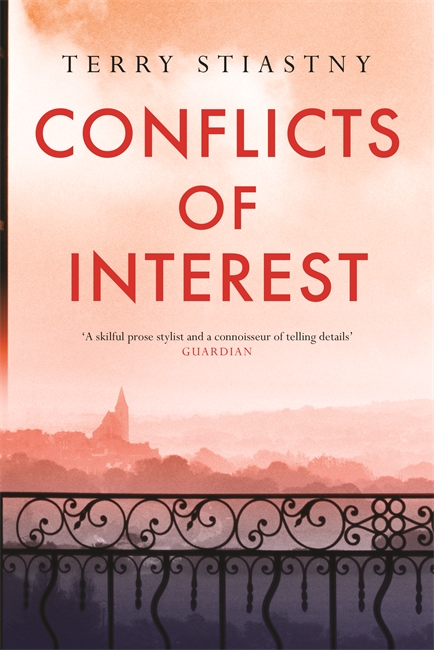
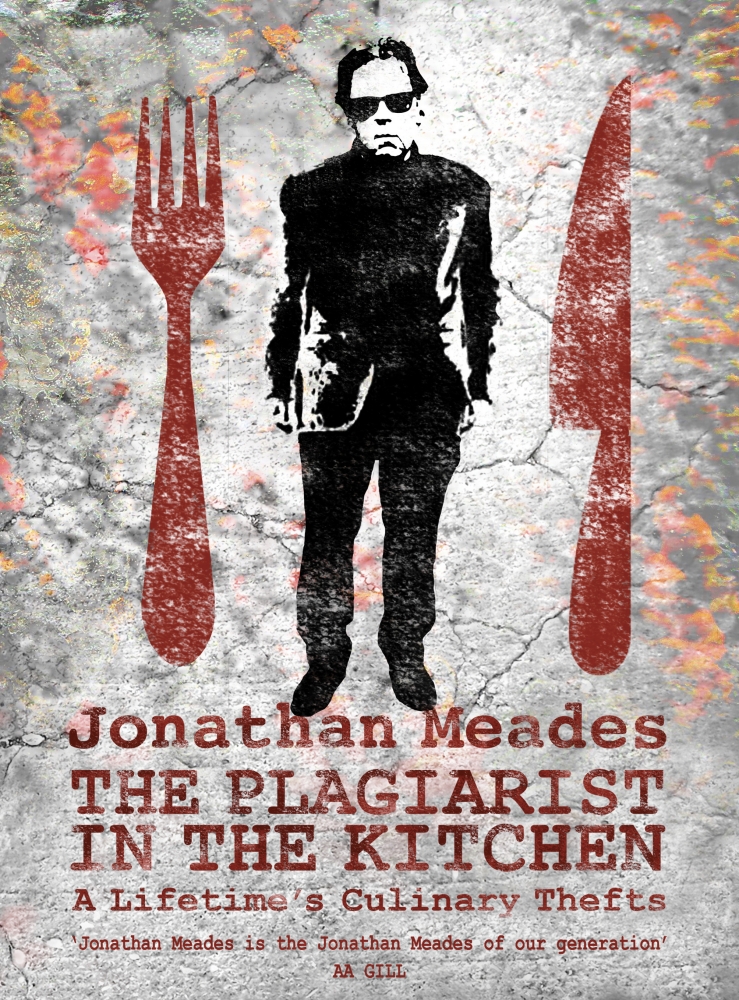
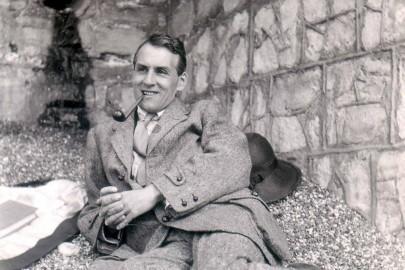







We can not be distinguished from one another.
Last night I watched ‘Vera’. Or, to be strictly accurate, I was in the room whilst ‘Vera’ was playing, and robbing me of two hours of life I will never get back. I recently saw a few episodes of ‘The Killing’ and watched Sarah Lund go about her business – this, in the manner of research, as I had read a number of enraptured reviews that led me to believe that this show would change my life. My life has continued in much the same plane as before – thankfully.
But both these programmes served to remind me of why, at least since the present century began, the likes of HBO and AMC have forged ahead of anything being made on this side of the pond – starting with razor-sharp writing, and building upon the dialogue with acting that is fit to deliver it.
My thanks Jon, for your marvellous encapsulation of this masterwork
very good in depth review of Breaking Bad, you’ve managed to fit the whole sprawling lot in here Jon.
To me it will always be second to Sopranos though! 😀
Thank you! Mahlerman, I must confess I loved The Killing too… I sometimes find with longer serials that there’s a scene quite early on which suggests it’s something of a higher level. For me, with BB it was Walt realising Elliott’s job offer was because he cancer. In The Killing, there was a scene where the parents of Nanna, the murdered girl, had to identify her body. The standard form is that you see them weeping and wailing when the sheet is pulled back. Instead they just had the undertaker come into the waiting room and tell them that he was just getting her ready and it would take about ten minutes. So they sat there in silence on camera, and you thought, ‘yes, they’d be about the worst ten minutes of your life’. It was superbly done. Loved the Sopranos too Worm – can’t argue with that!
I\’m really enjoying Better Call Saul. Not quite the dramatic peaks of BB but really well written, plotted and acted. As well as Saul\’s backstory, you also learn Mike\’s – both terrifically well-wrought and compelling characters. It\’s all very funny too.
yes Im really liking BCS – they go into the characters with even more depth which I really enjoy (and the characters are a bit more likeable than in BB) – there are a few ‘flat’ bits that could have been trimmed, but overall its very enjoyable
I have not seen Breaking Bad. As to American Beauty, I say “Meh.” When I saw it, I was about the age Spacey’s character was supposed to be, and it struck me that the male boomers had exhausted the spiritual possibilities of pot, muscle cars, self abuse, free weights, and fast-food jobs about the end of the Nixon Administration. The movie seemed to me to be Hollywood deep, a nightmare fantasy of the world outside the LA basin.
Also, why is male rage such a big deal in Hollywood? The aging male may have a hard enough time there, but he can play the love interest or the hard ass well into his social security years. The prospects for aging actresses are a good deal worse
Would it be OK to live in a sort of crouching position?
Nige = genius.